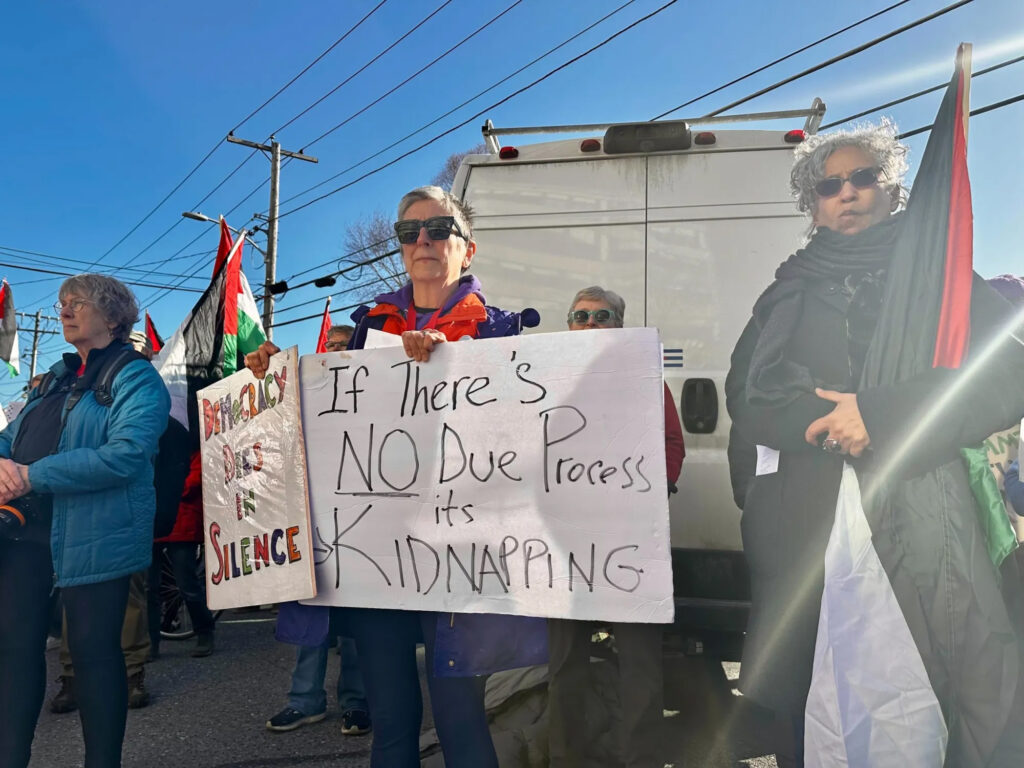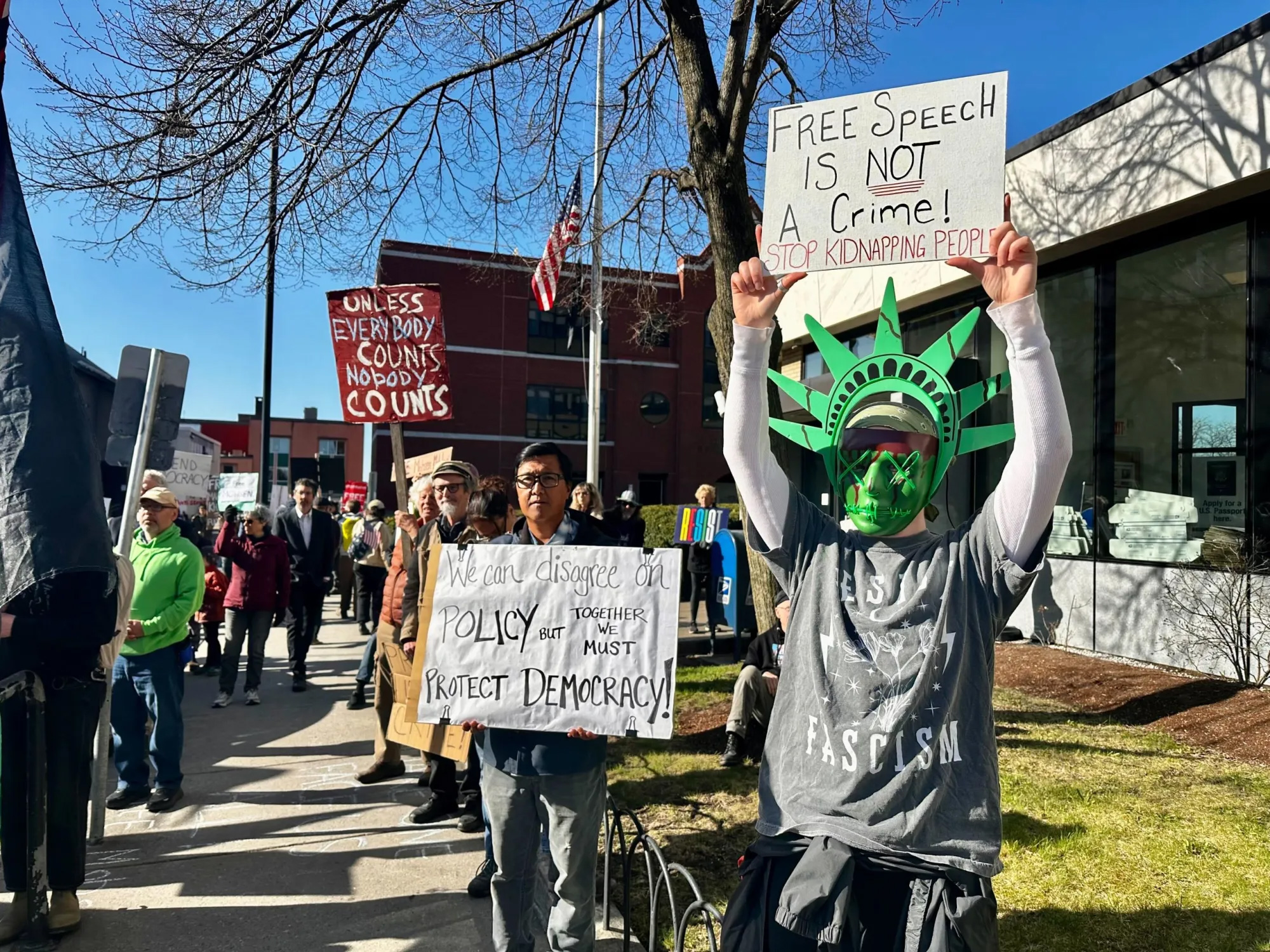Story Update: On Wednesday, April 30, Judge Geoffrey W. Crawford ordered the release of Mohsen Mahdawi from prison on bail, pending the resolution of his habeas petition. The government requested that Judge Crawford pause his release from prison for seven days by issuing a stay of the order, which the judge denied.
By Ethan Weinstein/
VTDigger
Lawyers for Mohsen Mahdawi, a Palestinian activist arrested in Vermont last week, argued in federal court Wednesday, April 23, that the Upper Valley resident had been unlawfully detained by federal immigration authorities and should be released.
“Mohsen Mahdawi sits in a jail cell,” said Luna Droubi, one of his attorneys at the hearing, “because of his lawful speech.”
Mahdawi, a student organizer at Columbia University and a lawful U.S. resident for a decade, was arrested by federal agents in Colchester during an interview as part of his U.S. citizenship naturalization process.
At that meeting, Mahdawi affirmed his commitment to “defend the Constitution and laws of the United States of America against all enemies, foreign, and domestic,” according to court filings submitted by his attorneys.
But afterward, an immigration official told Mahdawi he needed to “‘check’ on some information,” and “ICE agents, masked and visibly armed, entered the interview room and shackled” Mahdawi, according to the filing.
The federal officers ushered Mahdawi into a vehicle and attempted to get him on a plane en route to Louisiana, his lawyers said. But Mahdawi’s attorneys quickly filed a lawsuit, and a judge issued a temporary order to keep him in Vermont. He was later detained at Northwest State Correctional Facility in St. Albans, where he continues to be held.
Attorneys for Mahdawi have argued he was detained in retaliation for promoting Palestinian rights and opposing Israel’s military campaign in Gaza. They also cited a memo written by U.S. Secretary of State Marco Rubio — reported by the New York Times — that argued the Columbia student’s activism could “potentially undermine” Middle East peace talks.
The federal government, meanwhile, has said Mahdawi should be removed from the country because his presence “would have serious adverse foreign policy consequences and would compromise a compelling U.S. foreign policy interest,” citing Secretary Rubio, according to court documents.
On Wednesday, U.S. District Court Judge Geoffrey Crawford extended for 90 days the temporary restraining order that forces the government to keep Mahdawi in Vermont. Judge Crawford also said he intended to schedule a hearing for next Wednesday, where he might rule on whether the federal government can continue detaining Mahdawi.
“I recognize the urgency,” Judge Crawford said at the hearing, adding that he needed to give the federal government the opportunity to file further arguments. “I wish we could do it today, but I don’t think that would be fair for the government.”
Asked by the judge about the temporary restraining order keeping Mahdawi in Vermont, acting U.S. Attorney Michael Drescher, who represented President Donald Trump’s administration, said he was “not authorized” to consent to extending the order.
And regarding Mahdawi’s continued detention, Drescher argued that Immigration Court rather than Federal District Court had jurisdiction over the issue.
In turn, Mahdawi’s lawyers argued that an immigration court wasn’t the proper venue to rule on the constitutional violations against free speech they allege.
Considering Mahdawi’s continued detention or release, Judge Crawford referenced the circumstances of his arrest in Colchester.
The federal government wouldn’t have sent a “cavalcade of SUVs” and a “posse of agents” unless “they had something in mind,” he said without elaborating.
Asked by the judge about his treatment in a Vermont prison, Mahdawi told the court that “people have been very kind.” Following the hearing, as he exited the crowded courtroom, he extended two-fingered peace signs to the friends and family.
Outside the courthouse, hundreds of supporters rallied to call for the Vermont resident’s release, and for the freedom of the Palestinian people.
Nora Rubinstein, of Middletown Springs, said she was inspired to attend Wednesday to defend “democracy and freedom” and help the U.S. “return to the democratic principles this country was founded on.”
“It’s time to end the shredding of our democracy, the shredding of our Constitution,” Rubinstein said.
Following the hearing, Mahdawi’s legal team addressed the press and the gathered crowd, calling the morning a “victory” and stressing the case’s importance for all immigrants in the U.S.
“We are very hopeful that he will be released,” Cyrus Mehta, one of Mahdawi’s lawyers, said. “The judge wants to move quickly, and he realizes that this is a case of great importance for this country.”
Mahdawi faces a separate case in immigration court in Louisiana, according to court filings from his lawyers, where they allege federal immigration authorities had a “clear plan to ship him.”
Earlier this week, U.S. Sen. Peter Welch, D-Vt, visited Mahdawi in the St. Albans prison, sharing a video of their conversation on social media. In the recording, the detained Vermonter told supporters he was in “good hands” and “staying positive.”
Court filings indicate Mahdawi was set to graduate from Columbia University next month and intends to pursue a master’s degree from the school as well. While a student there, Mahdawi co-founded the Palestinian Student Union, according to his attorneys.
In a statement shared by his lawyers Wednesday, Mahdawi encouraged the public to remain hopeful.
“This hearing is part of the system of democracy. It prevents a tyrant from having unchecked power,” he said. “A system of democracy guarantees freedom of speech. Speaking of Palestine does not only qualify as freedom of speech, but it is also about our humanity.”
Neal Goswami contributed reporting.

Sal Millichamp, center, of Burlington attends a protest outside of the federal court in Burlington on April 23.




